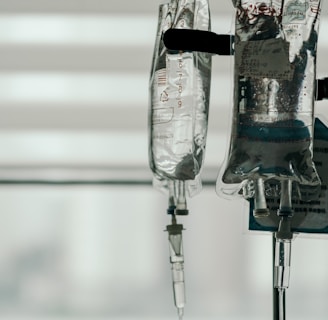I Started Grieving in the Hospital – When Will It End?
For many people, grief begins before the moment of death—sometimes at the hospital bedside, during a long illness, or while witnessing a loved one’s decline. This article explores the emotional experience of anticipatory grief and what it means for your healing journey after the loss.
5/14/20253 min read


I Started Grieving in the Hospital – When Will It End?
If you sat by their bedside, watched the monitors, held their hand through tears, or had to make impossible decisions while they were still alive, you may have started grieving long before the funeral.
This kind of early sorrow has a name: anticipatory grief. And it’s real, valid, and exhausting.
Many people assume grief begins the moment someone dies. But when a loved one is critically ill or facing the end of life, you might already be mourning:
The loss of who they used to be
The life you shared before illness took over
The impending reality of being without them
So when people say “you must still be in shock,” you might quietly think: I already cried my heart out weeks ago. Or when others expect you to “start grieving now,” you may feel confused, because the process is already well underway.
What Is Anticipatory Grief?
Anticipatory grief is the emotional pain that arises when we know a loss is coming. It can include:
Sadness and dread
Helplessness and anxiety
Anger at the situation
Guilt about wishing for peace or an end to suffering
It’s common in those caring for a partner, parent, a sick child or close friend during a prolonged illness. You may swing between hope and despair daily, grieving both the person they once were and the changes ahead.
You are already grieving—and that matters.
After the Death: A New Kind of Grief Begins
Even if you've been grieving for weeks or months beforehand, the moment of death can still land with a heavy finality. You might feel:
Numb or relieved
Shocked, even though you “knew it was coming”
Disoriented by the quiet after the chaos of hospital visits or caregiving
Confused that your grief feels different than what others expect
You may also wonder, if I’ve been grieving this long already, why does it still hurt so much?
Because anticipatory grief doesn't cancel out grief after death. They're connected—but separate.
When Will It End?
This is a question without a simple answer. Grief has no timeline, especially when it began long before the actual loss.
But here’s what we know:
Your grief will change. It may not disappear, but it can soften.
The pain will not always feel this sharp or constant.
You will grow around your grief, not away from it, but with it.
The intensity of your hospital experience, seeing your loved one in pain, making difficult choices, and feeling powerless, can add layers of trauma or emotional exhaustion. If your grief feels stuck or overwhelming, talking to a therapist who specializes in loss may help you process what happened before the death, as much as after.
You’ve Been Holding So Much
You carried a heavy emotional load before anyone else saw the full weight of the loss. Maybe you stayed strong for others. Maybe you broke down behind closed doors. Maybe you felt like you were grieving in isolation because others didn’t understand that the loss had already begun for you.
You’re not wrong to feel this way. You’re not “overreacting.” You’re not alone.
Give Yourself Permission to Rest and Heal
You don’t need to start over now that the funeral is over. You’ve already been grieving, and your body and heart know that.
What you need now is:
Rest—Physical and emotional recovery after long-term stress or caregiving.
Gentleness—Let go of expectations about “how” to grieve.
Validation—Your early grief was real. Your ongoing grief is real.
Support—From people who understand this particular kind of journey.
There is no finish line. But there are softer days ahead. You have already made it through more than most people know. You’re allowed to grieve in your own way, on your own timeline—and you’re allowed to heal.
We're Here to Support You
MONTHLY
🕐 Every third Tuesday of the month, 1:00 PM – 3:00 PM
CLARE HEALTH CENTRE, LOWER LEVEL
📍 8559 Highway 1, Meteghan Centre, NS
Contact Us
JOAN TUFTS
Coordinator
📞 (902) 778-1402
© 2025 Circles of Grief | Privacy Policy
Branding & Website by THERASOL – MarketingForTherapists.ca | A division of AtlanticOnline.ca | Photography by PWL
